Want to reach more customers online? Google Ads can be a game-changer for small businesses, giving you the power to target potential customers when they’re actively searching for products or services you offer. However, getting started can feel overwhelming if you’ve never used Google Ads before.
In this guide, we’ll break down the basics so you can confidently create your first Google Ads campaign and start driving traffic to your business. Let’s get started!
Table of Contents
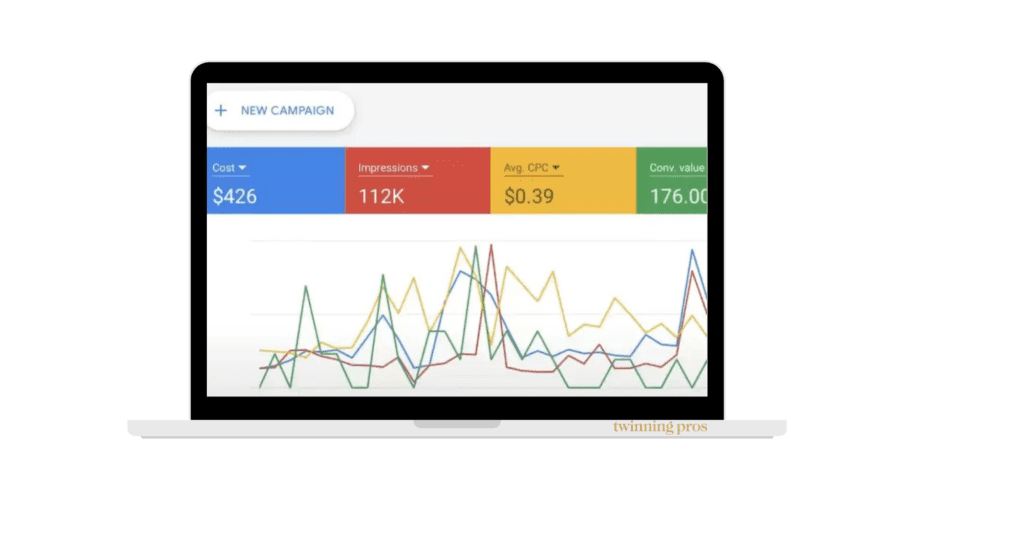
Why Google Ads is a Powerful Tool for Small Businesses
Google Ads allows small businesses to advertise directly to people who are already searching for what you offer. When done right, it can generate immediate traffic and high-quality leads. The beauty of Google Ads is that it’s cost-effective—you only pay when someone clicks on your ad (pay-per-click model), so your investment is targeted at potential customers.
Many s
mall business owners avoid Google Ads, thinking it’s too complex or expensive. But with the right strategy, it can be a highly effective tool, even on a small budget. By the end of this post, you’ll have the knowledge to create a campaign that fits your budget and drives results.
Related reading: How to Use Targeting to Maximize Your Paid Advertising Budget
Understanding How Google Ads Works
What Are Google Ads?
Google Ads is an online advertising platform where businesses bid on keywords to display their ads on Google search results and across the Google Display Network. You choose the keywords that trigger your ad and set a budget for how much you’re willing to pay per click. This pay-per-click model ensures you’re only charged when someone interacts with your ad.
Key Components of a Google Ads Campaign
- Keywords: These are the search terms people use on Google that you bid on. When users search for these keywords, your ad may appear.
- Ad Groups: These help organize your ads by themes. Each ad group targets a specific set of keywords.
- Bidding: You set the maximum amount you’re willing to pay for a click. Google uses an auction system to determine where your ad ranks based on your bid and ad quality.
- Ad Copy: The text of your ad should be compelling and include a clear call to action (CTA) to drive clicks and conversions.
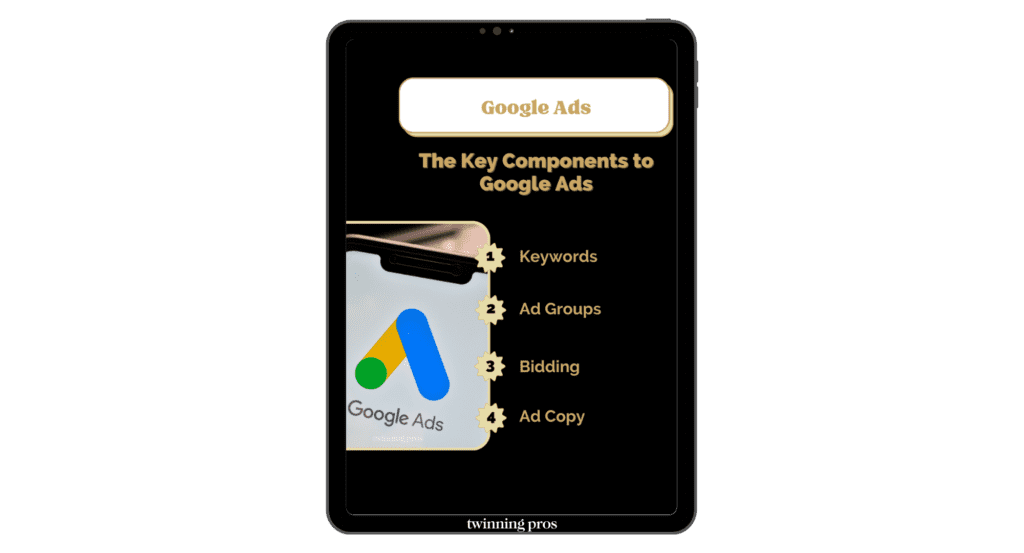
Steps to Create Your First Google Ads Campaign
1. Set Clear Goals for Your Campaign
Before launching your campaign, identify what you want to achieve. Are you trying to drive more traffic to your website, generate leads, or increase sales? Clear goals help you create focused ads and measure success.
Twinning Pros Tip: Define specific goals like “Increase website visits by 20% this month” or “Generate 50 new leads.” Clear objectives will guide your strategy and help you stay on track.
2. Choose the Right Keywords
The success of your Google Ads campaign largely depends on selecting the right keywords. These are the search terms your target audience uses when looking for products or services like yours.
How to do it: Use Google’s Keyword Planner to find relevant keywords. Start with specific, long-tail keywords (e.g., “local bakery near me” instead of “bakery”) to attract the right audience.
Twinning Pros Tip: Target keywords with medium competition and high relevance to your business. This approach ensures you’re reaching interested customers without overspending.
3. Write Compelling Ad Copy
Your ad copy is what grabs the attention of potential customers. It needs to be clear, compelling, and action-oriented.
How to do it: Highlight your unique selling proposition (USP) and include a strong CTA. For example, “Get 20% off your first order—Shop Now!”
Twinning Pros Tip: Always test different versions of your ad copy to see what resonates best with your audience. Small changes can have a big impact on your click-through rate (CTR).
4. Set a Budget and Bidding Strategy
With Google Ads, you control your budget. Set a daily limit so you never spend more than you’re comfortable with. Your bidding strategy affects how often and where your ads appear.
How to do it: Start with a manageable budget, and use the “Maximize Clicks” bidding strategy for beginners. This option allows Google to automatically adjust your bids to get as many clicks as possible within your budget.
Twinning Pros Tip: As you gain experience, consider testing manual bidding strategies to optimize performance for specific keywords.
5. Launch and Monitor Your Campaign
Once your campaign is live, it’s important to monitor its performance regularly. Google Ads offers tools to track key metrics like clicks, impressions, cost-per-click (CPC), and conversions.
How to do it: Use these insights to adjust your keywords, ad copy, or bids based on performance. Make data-driven decisions to improve your campaign’s effectiveness over time.
Twinning Pros Tip: Don’t just set it and forget it—ongoing optimization is key to getting the most out of your Google Ads budget.
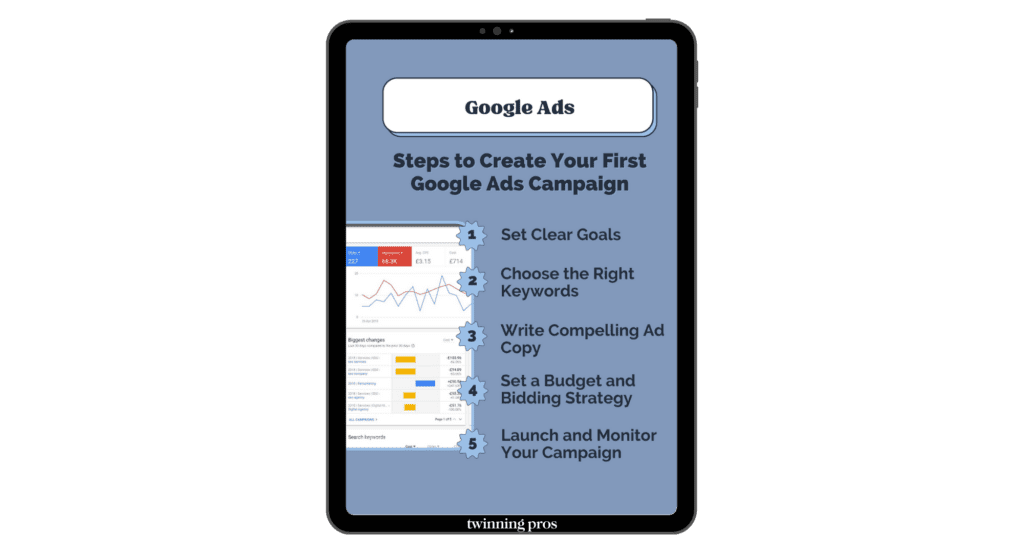
Common Google Ads Mistakes to Avoid
Targeting Broad or Irrelevant Keywords
Targeting too broad of a keyword range can lead to wasted ad spend. When your keywords are too general, you may attract clicks from users who aren’t interested in your products or services.
How to avoid it: Focus on specific, relevant keywords that match the intent of your target audience.
Ignoring Negative Keywords
Negative keywords prevent your ads from showing up for irrelevant searches. Without them, you could be wasting money on clicks that don’t convert.
How to avoid it: Regularly update your negative keywords list to exclude terms that don’t align with your business offerings.
Not Testing Ad Copy or Landing Pages
Sticking to one ad copy or landing page without testing alternatives can limit your campaign’s success.
How to avoid it: Continuously A/B test different versions of your ad copy, calls to action, and landing pages to see what generates the best results.
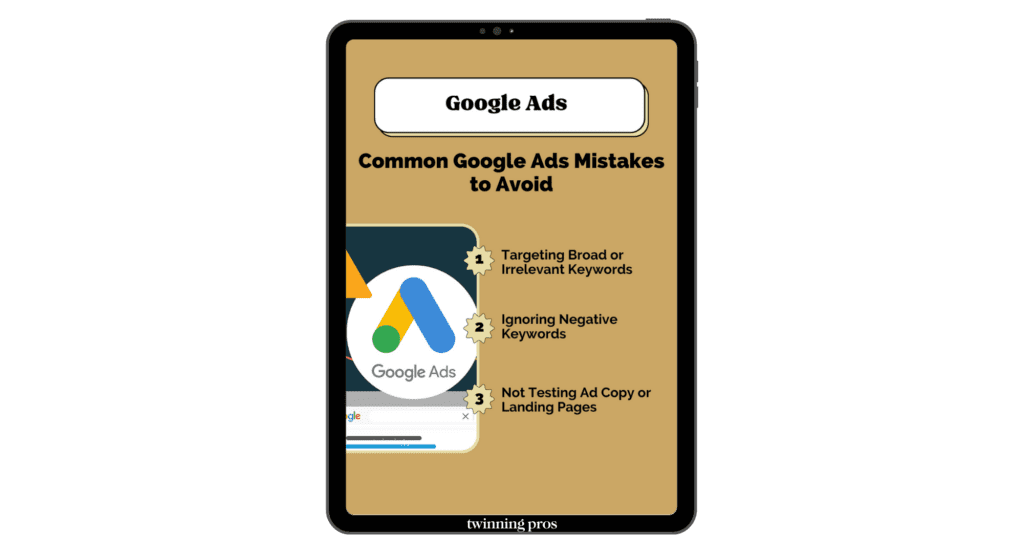
Tips for Optimizing Your Google Ads Campaign
Refine Your Targeting with Ad Extensions
Ad extensions allow you to add more information to your ads, such as your phone number, address, or links to specific pages on your website. These extensions make your ads more useful and increase the likelihood of clicks.
Focus on Quality Score
Google’s Quality Score rates the relevance and quality of your ads and keywords. A higher score leads to better ad placement and lower costs per click.
How to improve it: Make sure your ad copy is relevant to your keywords, and optimize your landing pages for a seamless user experience.
Monitor and Adjust Your Campaign Regularly
Google Ads is not a set-it-and-forget-it platform. Regularly monitor your campaign’s performance, and adjust your keywords, bids, and ad copy to continually improve results.
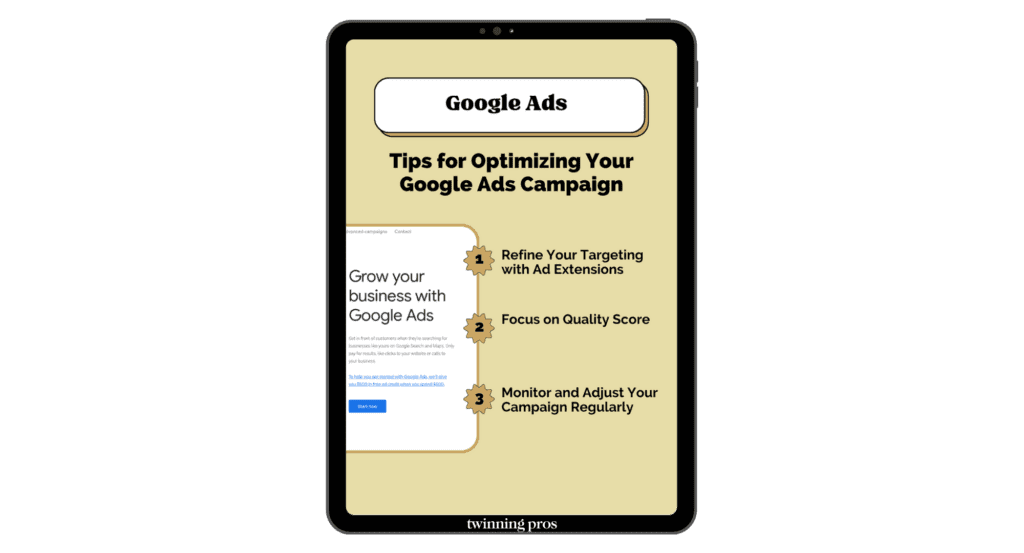
Conclusion: Start Your Google Ads Campaign Today
Google Ads can be a powerful tool for small businesses looking to reach more customers and grow their brand online. By setting clear goals, choosing the right keywords, writing compelling ads, and monitoring your performance, you can create campaigns that deliver real results for your business.
Need help optimizing your current Google Ads campaign? Get in touch with Twinning Pros to discover how we can help you drive more traffic and conversions through data-driven Google Ads strategies.
Looking to dive further into which Marketing Strategy is best for your business, check out Paid Ads vs. Organic Marketing: Which is Best for Your Business?
SEO for Beginners
Learn from the SEO Strategist who has 75+ first page Google rankings under her belt.
We’re marketing nerds and business strategists that have generated millions of dollars in client revenue. We're sharing the systems and strategies to help your growing business with marketing that actually converts.
We're Tiffany + Tabatha

Comments